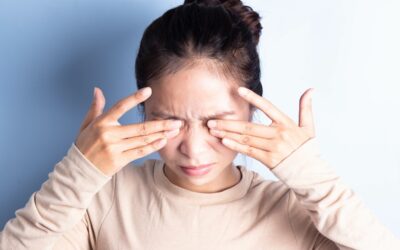Have you ever experienced eye strain, blurry vision, or headaches after staring at a computer or phone screen for several hours? If yes, then you’re not alone. Millions of people around the world are experiencing similar symptoms due to excessive screen time. In today’s digital age, it’s nearly impossible to avoid screens, but understanding their impact on our eye health is crucial. Keep reading to learn how screen time affects our eye health and what you can do to keep your eyes healthy.
Digital eye strain
Digital eye strain, also known as computer vision syndrome, is a condition that results from the prolonged use of digital devices. Computers and other digital devices emit high-energy short-wavelength blue light. Our bodies need blue light to regulate our sleep-wake cycle and support alertness during the day, but too much exposure, especially from screens, can harm our eyes and overall health.
Digital eye strain can affect anyone working on digital devices like smartphones, tablets, laptops, and desktop computers. It can cause symptoms such as:
- Eye fatigue or tiredness
- Dryness or irritation in the eyes
- Redness or bloodshot eyes
- Blurred or double vision
- Headaches or migraines
- Neck and shoulder pain
- Difficulty focusing
- Sensitivity to light
Myopia
Myopia is a common vision condition that causes distant objects to appear blurry. It occurs when the eyeball is too long or the cornea is too curved, causing light to focus in front of the retina instead of on it. Myopia usually develops in childhood and tends to worsen with age until the eyes stop growing in late adolescence or early adulthood.
Studies have found that excessive screen time may increase your risk of developing myopia. The blue light emitted by digital screens may damage the retina and cause oxidative stress, which can damage the cells that contribute to clear vision. Additionally, prolonged screen time can cause eye strain, which may trigger the onset of myopia or worsen an existing condition.
Dry eye syndrome
When we look at screens, we tend to blink less often, leading to dry eye syndrome. Blinking helps to spread tears over the eyes to keep them lubricated and comfortable. However, when we don’t blink frequently enough, the tears evaporate, causing discomfort.
Sleeping problems
Excessive screen time can also have an impact on your sleeping habits. The blue light emitted by screens can interfere with your body’s production of melatonin, a hormone that regulates sleep. This can lead to difficulty falling asleep and staying asleep. To avoid sleeping problems, try to avoid screens for at least an hour before bedtime and use a blue light filter on your devices.
How to protect your eyes from screen time
Protecting your eyes from screen time is crucial in today’s technologically driven world. Here are some tips to help you build healthier screen time habits:
- Follow the 20-20-20 rule: Every 20 minutes, take a 20-second break and look at something at least 20 feet away. This helps reduce eye strain and encourages blinking.
- Adjust screen settings: Ensure proper brightness, contrast, and font size for comfortable viewing.
- Optimize your workspace: Position the screen at an appropriate distance (about an arm’s length away) and adjust the height and angle for comfortable viewing.
- Use the right lighting: Lighting is crucial to preventing eye strain and fatigue. Working in dim light can be just as bad as working in bright light. Avoid using screens in complete darkness to reduce contrast strain. Try to position your screen so that it’s perpendicular to any windows to avoid glare. Also, use soft, warm lighting that doesn’t create harsh shadows or bright reflections.
- Use artificial tears: Lubricating eye drops can help alleviate dry eye caused by excessive screen time.
- Minimizing glare: Reduce glare from screens by using anti-glare filters or adjusting lighting conditions in the room.
- Limit screen time before bedtime: As mentioned above, avoid screens at least an hour before bedtime to prevent disruptions in your sleep patterns caused by blue light exposure.
- Schedule regular eye exams: Routine eye exams can detect any underlying vision problems and ensure proper eye health. Your eye doctor can check for any signs of eye strain or fatigue and recommend customized treatments or computer glasses to help keep your eyes healthy.
As technology continues to advance, it is crucial to be mindful of the impact screens can have on our eyes. At Northwest Hills Eye Care in Austin, Texas, we are committed to helping you understand and protect your eye health in the digital age. Contact us today to schedule an eye exam and learn more about how to maintain healthy vision in the era of screens.



